|
|
|
Sort Order |
|
|
|
Items / Page
|
|
|
|
|
|
|
| Srl | Item |
| 1 |
ID:
167675
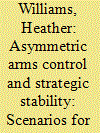

|
|
|
|
|
| Summary/Abstract |
Can arms control incorporate emerging technology? Other articles in this special issue identify potential risks emerging technologies pose to stability and how they are intertwined with international politics. Is there a future for multilateral strategic arms control? This article looks ahead to explore how arms control might reduce those risks but in order to do so we must update concepts of both arms control and strategic stability. Building on Thomas Schelling and Morton Halperin’s seminal study into the relationship between strategic stability and arms control, this article offers an original framework – asymmetric arms control – for incorporating new technologies, which is then used to identify six scenarios for arms control of hypersonic glide vehicles (HGVs). It concludes that arms control can potentially reduce the risks to strategic stability associated with emerging technologies by incorporating dynamism into arms control design. Ultimately, asymmetric arms control can best contribute to strategic stability by crossing domains and reflecting the cross-domain nature of international conflict, and the framework has potential application to emerging technologies beyond HGVs.
|
|
|
|
|
|
|
|
|
|
|
|
|
|
|
|
| 2 |
ID:
191949
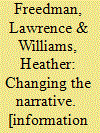

|
|
|
|
|
| Publication |
Oxon, Routledge, 2023.
|
| Description |
163p.pbk
|
| Series |
Adelphi series; 493-495
|
| Standard Number |
9781032707860
|
|
|
|
|
|
|
|
|
|
|
|
Copies: C:1/I:0,R:0,Q:0
Circulation
| Accession# | Call# | Current Location | Status | Policy | Location |
| 060439 | 320.014/FRE 060439 | Main | On Shelf | General | |
|
|
|
|
| 3 |
ID:
149667
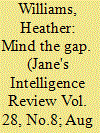

|
|
|
| 4 |
ID:
157435
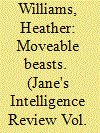

|
|
|
| 5 |
ID:
151784


|
|
|
| 6 |
ID:
160984
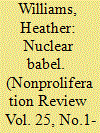

|
|
|
|
|
| Summary/Abstract |
The 2017 Treaty on the Prohibition of Nuclear Weapons has been successful in starting new conversations about nuclear weapons. Unfortunately, many of those conversations are happening in silos with ban supporters and opponents talking past each other. Both sides of the debate often misrepresent one another, putting at risk cooperation within the global nuclear order and progress toward the 2020 Nuclear Non-Proliferation Treaty Review Conference. To address these misperceptions, this article offers a bridge-building framework with steps for nuclear-weapon states, ban supporters, and regional and political coalitions. The framework is designed to be practical and to build trust following a heated and controversial debate around the ban treaty and its predecessor, the humanitarian impacts of nuclear weapons movement. The most important and timely of these efforts is for ban supporters and opponents to work together on risk reduction at a time of heightened geopolitical tensions with rising risks of misperception and inadvertent escalation.
|
|
|
|
|
|
|
|
|
|
|
|
|
|
|
|
| 7 |
ID:
152380


|
|
|
|
|
| Summary/Abstract |
During the 2016 American presidential campaign, Democrats and Republicans alike repeatedly raised concerns at the prospect of Donald Trump being in charge of America’s nuclear arsenal based on his seemingly unstable personality. Unfortunately, this emphasis on Trump’s character distracted attention from any in-depth investigation into his long-standing interest in nuclear issues. This article seeks to remedy this shortcoming by highlighting the nuclear legacy Trump will inherit from Obama, surveying his statements on nuclear issues over more than three decades, and providing an analysis of constraining factors on his administration’s nuclear agenda, particularly domestic institutions. It finds that most of Trump’s views on nuclear issues are relatively consistent with past Republican presidents. Where he is unique, however, is in his use of social media, which has potential implications on nuclear signaling.
|
|
|
|
|
|
|
|
|
|
|
|
|
|
|
|
| 8 |
ID:
150100
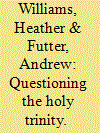

|
|
|
|
|
| Summary/Abstract |
Despite renewed enthusiasm for nuclear disarmament, a contemporary security environment far removed from that of the Cold War, and increasing budgetary pressures at home, U.S. interests continue to be best served by retaining a triad of nuclear forces. While options for a reduced force structure may appear to offer short-term political and economic expediency, in the long run a three-legged deterrent—possibly consisting of fewer delivery vehicles, operational warheads and even potentially de-alerted forces—represents the best way to balance the competing requirements of contemporary and future U.S. nuclear policy. Indeed, it may be that retaining the triad provides the most realistic method of reestablishing U.S.-Russia strategic stability, and the most credible basis for advancing the drive for global nuclear reductions, strengthening global nuclear security, and even working toward nuclear abolition.
|
|
|
|
|
|
|
|
|
|
|
|
|
|
|
|
| 9 |
ID:
143134
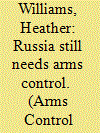

|
|
|
|
|
| Summary/Abstract |
These are dark days for strategic arms control. Events in Ukraine have brought U.S.-Russian relations to a post-Cold War low point, and Russia increasingly relies on its nuclear arsenal for signaling and prestige. Yet, if Russia hopes to achieve its aim of being a great power or at least being perceived and treated as one, arms control is a status symbol and cost savings mechanism that it cannot afford to waste.
|
|
|
|
|
|
|
|
|
|
|
|
|
|
|
|
| 10 |
ID:
158015


|
|
|
|
|
| Summary/Abstract |
Reactions to the 2018 US Nuclear Posture Review (NPR) have ranged from highlighting its continuity with the views of the Obama administration,1 on the one hand, to warning that it is ‘hastening the rise of a more dangerous world’ by increasing reliance on nuclear weapons, on the other.2 One analyst, somewhere in between these two poles, acknowledges a continuity of doctrine in practical terms, but argues that the ‘tone’ and spirit of US nuclear policy has changed.
|
|
|
|
|
|
|
|
|
|
|
|
|
|
|
|
| 11 |
ID:
177881
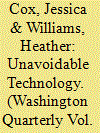

|
|
|
|
|
| Summary/Abstract |
Artificial intelligence (AI) is developing at a rapid pace—both the technology itself and its applications. It is becoming unavoidable in both the civilian and military domains and will soon impact numerous areas of civilian and military life. In July 2020, for example, countries such as Colombia and Russia applied facial recognition technology, a form of artificial intelligence, to combat the coronavirus by detecting whether someone was not wearing a mask or had a high temperature through the use of thermal cameras and sounding an alarm.
|
|
|
|
|
|
|
|
|
|
|
|
|
|
|
|
| 12 |
ID:
146320
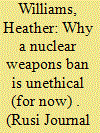

|
|
|
|
|
| Summary/Abstract |
The Humanitarian Impacts of Nuclear Weapons Initiative and ongoing tension between NATO and Russia have put the morality of nuclear weapons back under the spotlight. The new strategic environment suggests an opportunity to revisit principles of nuclear ethics, including the connection with security and the responsibility to pursue arms control and disarmament. Heather Williams argues that for NATO, that means balancing the need for nuclear assurances with a commitment to disarmament and engaging with the Humanitarian Impacts Initiative, perhaps by having a NATO nuclear possessor host the next conference. For the Humanitarian Impacts Initiative, meanwhile, it means abandoning pursuit of a nuclear-weapons ban and re-focusing on survivor testimonies as part of nuclear education and consequence-management scenarios. A nuclear-weapons ban at this time, though well intentioned, would ignore states’ security concerns and has the potential to undermine other disarmament efforts.
|
|
|
|
|
|
|
|
|
|
|
|
|
|
|
|
|
|
|
|
|